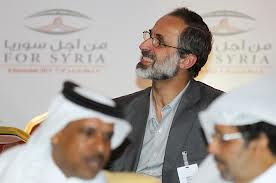 EU foreign ministers said on Monday they considered the new Syrian opposition to be “legitimate representatives” of the Syrian people, but stopped just short of according the full recognition granted by France.<
The European Union has long called for unification of the fractious movement trying to topple President Bashar al-Assad. France last week became the first European power to recognize the Syrian National Coalition as the sole representative of the Syrian people.
EU foreign ministers said on Monday they considered the new Syrian opposition to be “legitimate representatives” of the Syrian people, but stopped just short of according the full recognition granted by France.<
The European Union has long called for unification of the fractious movement trying to topple President Bashar al-Assad. France last week became the first European power to recognize the Syrian National Coalition as the sole representative of the Syrian people.
But other Western states are wary, uneasy over the presence of radical Islamists among the rebels and accusations by U.N. investigators of war crimes committed by insurgent fighters.
The bloc’s 27 foreign ministers, meeting in Brussels, said they welcomed the new coalition’s formation and called on it to work for full inclusiveness and to subscribe to the principles of human rights and democracy.
“The EU considers them legitimate representatives of the aspirations of the Syrian people,” the ministers said in a statement. “This agreement represents a major step towards the necessary unity of the Syrian opposition.”
British Foreign Secretary William Hague, who has said he needed to know more about the new opposition before offering full recognition, said he had had “a good meeting” with the new Syrian opposition on Friday in London.
He planned to speak to the British parliament later this week on how to increase support for the coalition.
“I was impressed with their objectives, with their clarity, with the breadth of their support, their determination to be inclusive in Syria of all communities and groups within Syria,” Hague told reporters on the sidelines of the Brussels meeting.
Recent events in the Middle East are testing EU foreign policy, which has run relatively smoothly when states have had time to hammer out common positions – ratcheting up sanctions against Iran and Syria this past year, for example.
But the European Union has struggled in the past to react quickly to rapidly breaking events, such as when Germany opposed military action during the popular uprising in Libya in 2011.
The EU ministers’ language on Monday was similar – though not identical – to that used by U.S. President Barack Obama on Wednesday.
Obama said then he was encouraged by the formation of the new Syrian opposition bloc and called it “a legitimate representative” for the Syrian people, but did not recognize it as a government-in-exile.
The conflict in Syria has killed an estimated 38,000 people so far, and France has called for a partial lifting of the EU’s weapons embargo on Syria so that opposition forces – currently outgunned by Assad’s army – can better arm themselves.
However, other EU countries are wary of any move that could lead to wider and heavier fighting and increase the death toll, and they stress the need for a political solution.
EU foreign affairs chief Catherine Ashton said the 27-nation bloc was offering strong support to the new opposition group.
She said it was important to move towards a political process that can lead to a lasting settlement, so that “everyone in Syria can feel that the future belongs to them”.
Reuters

Leave a Reply
You must be logged in to post a comment.